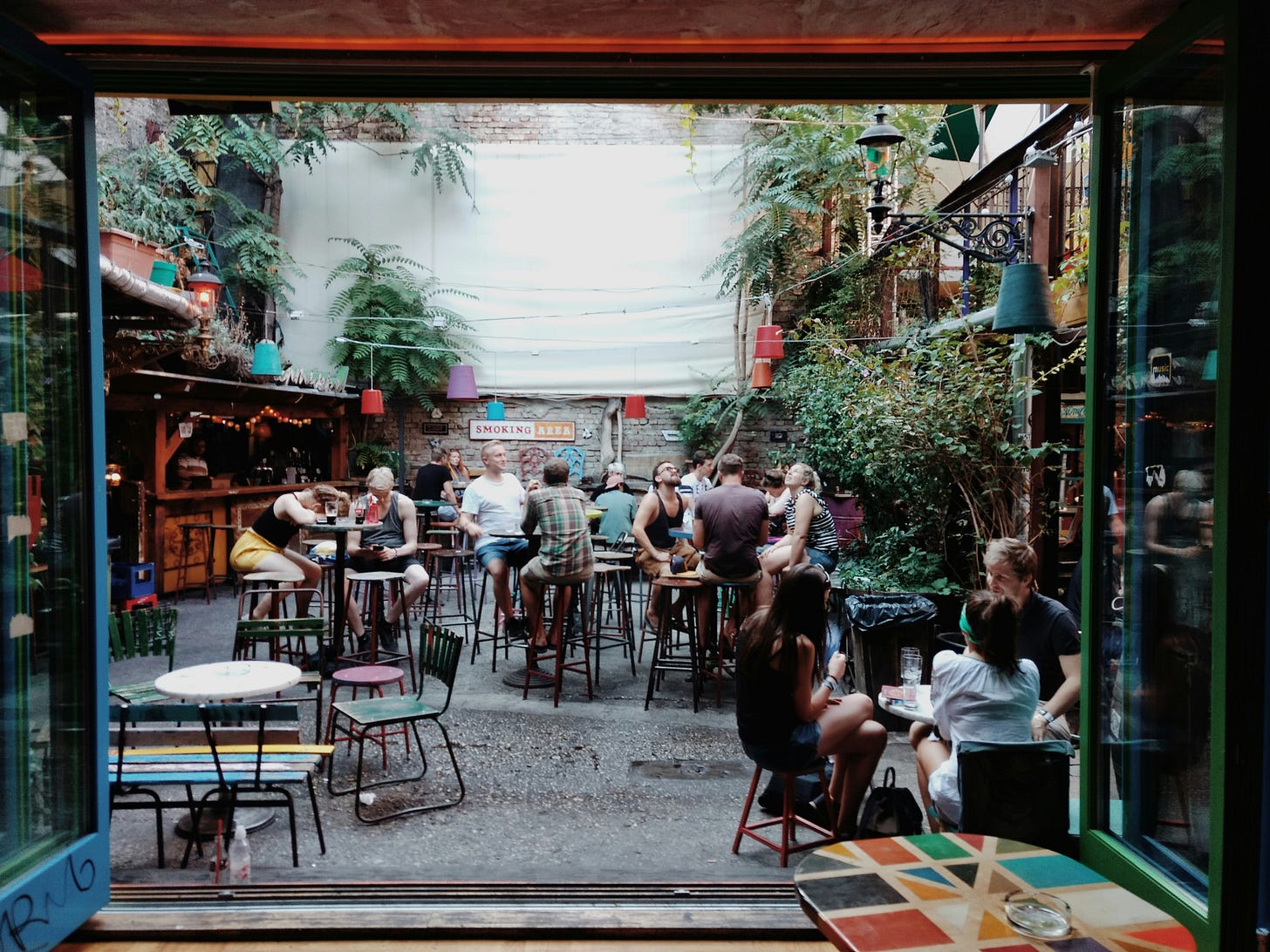Hello! Thank you for stopping by Naptime Novelist! To learn more about what kinds of stories you’ll find here, you can visit my Guidebook.
← In Part II, Penelope learned the truth behind the brewery’s failing magic.
Or start at the beginning with Part I!

What moments ago had been a sod-covered cellar roof was now a hole. Black sludge splattered the grass and the pebbled paths and the beautiful wooden tables, and soaked into the air was an acrid scent of scorched earth and twisted metal.
Aunt Greta didn’t protest when Penelope pulled her to her feet. She stood still, her skin blanched and eyes unblinking as gaping porcelain plates. Neither of them spoke as Penelope picked her way over the black puddles and the chunks of sod and brick and concrete that littered the ground, making her way toward the wreckage of the cellar.
The steps were slick with the foul-smelling sludge. Clinging to the railing, Penelope inched down, avoiding the gritty black slime even though it had already caked her shoes and stained her clothes and hands and face.
A distant, cautious voice inside her head warned her that the remaining ceiling could collapse, burying her in sod and concrete, but she kept moving down the stairs, Aunt Greta behind her.
At the cellar doorway, she had to climb over debris, hunks of earth and brick and metal. Dust hung thick in the air, mingling with the horrible scent and soaking into the muck that coated everything – the floor and shelves, the gnarled ruins of the fermentation tanks. Razor shards of metal were embedded in the cellar walls, shot across the room by the blast. She hadn’t known metal could twist and rip like shredded paper.
At a strangled sound behind her, Penelope turned her head to Aunt Greta, standing in the doorway on the other side of the pile of debris. Breath heaving, she covered her face with her hands and sank back against the wall.
Heart attack. Panic attack. Medical emergencies flicked like her father’s old Rolodex through Penelope’s numb thoughts, but her feet wouldn’t move from the sludge-slick concrete floor.
What had Aunt Greta put in the tank? What had she done? What could have built up so much pressure, enough to destroy the tanks, the cellar, their whole livelihood?
Had it even been whatever her aunt had put in the brew, or was it the beer itself that had rebelled, renounced them? The strange chemistry that infused Braun’s beer, that had sustained her family for centuries – had it left them, fled in the wake of Penelope’s ambivalence, of Aunt Greta’s betrayal?
The sudden wail of an approaching siren jerked Penelope’s consciousness back from the tangled depths of her mind.
“We’re insured,” she said, her voice raspy and foreign to her own ears. Without the special quality that turned their brews from a beverage to an elixir, Braun’s would never be the same. But they could still brew beer. They could still be a small-town craft brewery. They didn’t have to lose everything.
Aunt Greta’s hands dropped from her face, and her voice came out in a hiss. “Yes, we’re insured.”
“Greta?” A wavering voice drifted from the beer garden above – shy, quiet Ann Koch, who lived next door to the brewery. “Penelope? I called the fire department. Are you down there?”
Aunt Greta, tears leaving rivulets through the splatters of dust and black sludge on her face, backed away from the doorway as the screeching siren approached. “You’ve never cared about this place. You’ve never cared about it. It’s insured; that’s all that matters to you. The magic, it’s gone, not that you could ever feel it. It never chose you. And now it’s gone.” She pointed one shaking finger at Penelope. “You did this.”
An authoritative voice cut through the air. “Anyone down there?”
“You got what you wanted,” Aunt Greta spat, her grieved, manic eyes locked on Penelope. “Take the money and go!”
“Greta, is that you?” came the voice again, descending the stairs. “We’ve got the fire truck here, and an ambulance on the way. Can you get out?”
A bulky figure appeared in the shadowed doorway and took Aunt Greta’s arm. “Come on up with me, Greta. It’s not safe down here.” His deep voice was quiet, a hesitation mixed in with the firmness. It was the way people talked to the bereaved. The urge to comfort, the paralyzing fear of saying the wrong thing. It was the tone Penelope had heard in every voice for months after her father’s passing.
Turning, the fire chief peered through the dusty darkness into the wreckage of the cellar. “Penelope, is that you? Come this way toward the door. This place could collapse any minute.”
Penelope tried to walk. She had the conscious intention to move her feet, but the burnt smell, the darkness, the strange sludge that had once been the beer she’d so carefully crafted, all bore down on her with a paralyzing weight.
The fire chief’s voice faded to a tinny echo.
Even when he clambered over the piled debris, even when he grabbed her arm and dragged her out from under the shattered ceiling, Penelope was there in the dark, broken cellar, a piece of her trapped in the ruins.
One old, outdated fermentation tank.
A meager store of hops, malt, yeast.
Basil, ginger, lavender.
One bag of brown sugar.
Penelope held her hands to her cheeks, pressing her lips tight as she looked: the only salvageable remnants of the cellar.
The back corner of the cellar had been kept relatively safe from the blast and the foul, black geyser. The lone fermentation tank was dented and hadn’t been used in months, if not longer. The surviving ingredients were hardly enough for a single batch of beer.
The insurance money would be enough to sustain Aunt Greta and to get Penelope started someplace new. They could split the money. Penelope could leave.
Like she’d wanted.
Penelope rubbed a dried basil leaf between her fingers and let the gentle, spicy scent seep into her skin. She pressed her hand against the bag of brown sugar, still soft. She touched the vacuum-sealed container that held the hops – it was still cool, but too close to room temperature. She needed to get it into the freezer.
In Penelope’s marrow, something stirred. An instinct, a magic, a strange chemistry.
The steamy August afternoon cooled into twilight, and the pebbled paths flooded with sneakers and sandals and children’s bare, sand-speckled toes. A folk band played from the small stage, the twang of the banjo jangling above the chattering, laughing crowd.
A line stretched from the booth where Ann Koch, forgetting her shyness in the bustle, manned a table loaded with donated cookies and cakes and scones and sourdough bread. Above her head hung a colorful, hand-painted sign: Braun’s Beer Garden Grand Reopening Bake Sale.
From the beverage service window, Penelope spared a quick moment to take in the noisy, happy throng. Nearly the entire population of Rhinesburg had stopped by at one point or another that day, buying her first tentative batches of beer and clearing out the bake sale to which many of those same patrons had contributed sugary treats.
No one seemed to mind the small selection of brews, the simple ones that Penelope had decided to try first, before she revived the full menu. The staples were there: Littlehorn Lager (self-esteem stimulant), Ponderosa IPA (luck tonic), Braun’s Sasparilla (mood tonic and creativity stimulant) for the minors. And a new one, Penelope’s own fledgling creation: Braun’s Brown Sugar Lager (fellowship cordial).
Between the insurance money and the generosity of the town, Braun’s would survive.
Deep in her bones, Penelope had no doubt that the town would have rallied around the beer garden with or without the unique, centuries-old secret of the Brauns. Even if the Littlehorn Lager had contained nothing but malt, hops, yeast, and water, they would have come. Braun’s Beer Garden didn’t create the interwoven dynamics and families and bonds of Rhinesburg. It sweetened them. It softened the thorns, eased the inevitable pains and heartaches of community life.
At one of the tables, Penelope’s eyes caught on her aunt’s. Aunt Greta’s face looked older now, her shoulders more stooped. But the tense rancor that for years had hidden, unacknowledged by her and unknown by Penelope, behind the veil of her eyes had faded. This summer, spent without the beer garden and her lifelong intuition for the brews, but with a heavy burden of guilt, had aged her aunt years over the span of a few months.
Penelope offered a small smile, a tentative wave, which her aunt returned. It was a tricky, twisty river to navigate, the hesitant peace between them. Even with all the grace in the world, the day-to-day labor of forgiveness was fraught with hidden snares.
In the past weeks, Aunt Greta had answered Penelope’s questions, had offered advice. But she couldn’t stay too long in the newly-rebuilt cellar, couldn’t be too long around the brews. The hole in her marrow where there had once been a deep, cellular connection to her creations was a heavy loss, a grief.
But thrumming through Penelope like an extra sense, like a voice separate and yet part of her, was something new, and she could feel it growing stronger, adjusting to her, becoming at home with her.
Penelope bustled back and forth between the customers and the taps, filling glasses, making recommendations, smiling and making small talk. There was a jovial energy to the air that infected even the most dour faces with an unquantifiable cheer as the sweltering evening gentled, cooled by breezes from the river.
The twilight sent a warmth into Penelope’s skin, the same warmth she’d known in her father’s smile.
He’d be pleased. To see her here and happy.
The sky turned from deep blue to a canvas of purple and orange as Penelope turned to the next customer and found herself looking at a vaguely familiar face.
With a smile, the newcomer, the man who’d abandoned the big city for quiet little Rhinesburg, raised his hand in a slightly bashful greeting.
“Welcome back.” Penelope gestured to the menu. “You got Gemütlichkeit Ale last time, right? We don’t have that in stock yet, but if it sounds good, you can try our new beer, the brown sugar lager.”
“Wow,” he said. “You have a way better memory than I do. I can barely remember what I had for dinner last night. But yeah, the lager sounds great.”
When Penelope returned with a full stein, the man paused before stepping aside for the next customer, who was absorbed in a conversation with the person behind them. “I couldn’t believe it when I found out. I mean, I’ve heard of fermentation tanks exploding, but – Were you here when it happened?”
“Yeah,” Penelope said, her voice quiet. “Yeah, I was here. So was my aunt.”
“It’s crazy.” He shook his head. “Glad you’re both okay.”
Penelope nodded. There was joy here, and community, belonging, made somehow sweeter by the lingering grief of patched-up brokenness.
“This place is amazing.” The man held out his hand. “I’m Jack, by the way.”
Though customers lined up behind him, though the pressing need to rush and keep the beer flowing hovered at the fringes of Penelope’s awareness, she reached out and shook Jack’s hand, and in spite of the fan blowing on her, her neck and cheeks warmed.
“Penelope,” she said. “Welcome to Rhinesburg.”
If you enjoyed “The Brewer”, feel free to let me know with a like, comment, or restack!
Thank you so much for taking the time to read “The Brewer”! I’m so thankful to have a place to share stories with such kind, supportive readers. For the next couple weeks, I’ll be taking a short break from Saturday fiction to prepare for Judith Temple’s next case, Murmurs in the Walls.
If all goes well, the paperback and ebook of Down in the Holler will be available in time for the start of Murmurs in the Walls!
Although Down in the Holler, Judith’s first case, is currently behind a paywall on Substack, it will be available to read for free for one week prior to the release of Murmurs. If you haven’t had a chance to read it yet but would like to, you’ll have a short window of time to binge it and catch up on Judith’s adventures! Judith’s second case, Beasts of the Field, is currently available for free, although it too will go behind a paywall before long.
To read Beasts of the Field, click here:
Beasts of the Field - Table of Contents
Welcome to the Navigation Page for Beasts of the Field, a serial paranormal mystery novella featuring Judith Temple, psychic detective!
And here is the blurb for the soon-to-drop Murmurs in the Walls:
While recovering from the physical and emotional toll caused by her most recent case, Judith Temple decides to switch gears and take a stab at working as a paranormal investigator. When she receives a plea for help from a family who claims their house is haunted, Judith throws herself into the case, determined to get to the bottom of both the eerie happenings in the little home and also her own hopes and feelings regarding Sheriff Tim Morrissey.
In other news, The Midnight Vault is now available in ebook and paperback! The Midnight Vault is an anthology of short stories by dozens of Substack authors, including yours truly, and was curated by the indefatigable
and . You can pick up your copy here!







Awwww! Also, do Penelope and Judith exist in the same universe? That'd be fun, right? ROAD TRIP!
I'm so glad it had a happy ending! And I'm glad the mystery man turned out to be a good guy 😉 I'm really in love with the setting - a beer garden + magic was a great idea.